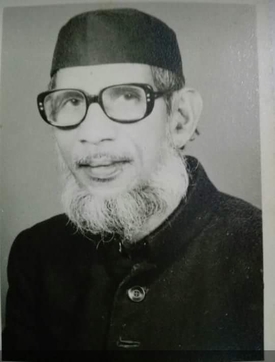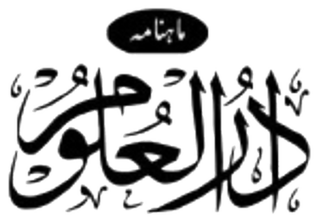Related Research Articles
Manazir Ahsan Gilani was an Indian Sunni Islamic scholar and former Dean of the Faculty of Theology at Osmania University. Some of his notable works include Tadwin-e-Hadith, Muqaddama Tadwin-e-Fiqh, Sawanih-e-Abu Dharr Ghifari, and Sawanih-e-Qasmi. Muhammad Hamidullah, a historian and hadith researcher, was among his students.

Muhammad Qasim Nanawtawi was an Indian Sunni Hanafi Maturidi Islamic Scholar, theologian and a Sufi who was one of the main founders of the Deobandi Movement, starting from the Darul Uloom Deoband.
Murtaza Hasan Chandpuri (1868-1951) was an Indian Sunni Islamic scholar. He was a disciple of Ashraf Ali Thanwi in the Chishti order of Sufism.

Nizāmuddīn Asīr Adrawi was an Indian Sunni Muslim scholar, biographer, historian and author in the Urdu language. He established Madrassa Darus Salam in Adari and served as Officer In Charge of Jamiat Ulama-e-Hind in Lucknow from 1974 to 1978.
Saeed Ahmad Akbarabadi was an Indian Islamic scholar and an Urdu-language author who co-founded the Nadwatul Musannifeen. He served as the dean of the Faculty of Theology in Aligarh Muslim University.
Noor Alam Khalil Amini was an Indian Sunni Muslim scholar, academic and a litterateur of Arabic and Urdu. He was a senior professor of Arabic language and literature at the Darul Uloom Deoband. His book Falastin Fi Intezari Salahidin was subject of a doctoral study at Assam University and his book Miftahul Arabia is part of dars-e-nizami curricula in various madrasas.
Yasir Nadeem al Wajidi is a Chicago-based Muslim scholar, author, public speaker, and debator. He is a mufti and teaches fiqh, hadith, and aqidah at the Islamic Institute of Education in Chicago. He is the founder of Darul Uloom Online and the author of books including Historical Study on Islamic Renewal and Islam and Globalization.

This bibliography of Darul Uloom Deoband is a selected list of generally available scholarly resources related to Darul Uloom Deoband, a leading Islamic seminary and Muslim theological centre in India at which the Deobandi movement began, founded in 1866. It is one of the most influential reform movements in modern Islam. It created a largest network of satellite madrasas all over the world especially India, Bangladesh, Pakistan, Afghanistan neighboring countries in Asia and beyond, and as far afield as the Caribbean, South Africa, United Kingdom and the United States. Islamic Revival in British India by Barbara D. Metcalf was the first major monograph specifically devoted to the institutional and intellectual history of Deoband. Syed Mehboob Rizwi wrote History of Darul Uloom Deoband in 1977 in 2 volumes. This list will include Books and theses written on Darul Uloom Deoband and articles published about Deoband in various journals, newspapers, encyclopedias, seminars, websites etc. in APA style. Only bibliography related to Darul Uloom Deoband will be included here, for Deobandi movement, see Bibliography of Deobandi Movement.

Wahīduzzamān Kairānawi (1930–1995), also spelt as Waheed-uz-Zaman Keranvi, was an Indian Islamic scholar, writer, lexicographer, and professor who specialised in Arabic. He spent around 27 years instructing Hadith and Arabic at Darul Uloom Deoband.
Nematullah Azami, also written as Nematullah Azmi and Ni'matullah Azami, is an Indian Islamic hadith scholar, a commentator on the Quran (mufassir), and a faqīh. He is the president of India's Islamic Fiqh Academy. He has also been serving as a senior lecturer at Darul Uloom Deoband for forty years.

Monthly Darul Uloom is an Urdu magazine published by Darul Uloom Deoband since 1941. Inaugurated under the supervision of Muhammad Tayyib Qasmi, with Abdul Wahid Ghazipuri as the initial editor, the magazine is currently edited by Salman Bijnori, guided by Abul Qasim Nomani. Comprising articles primarily authored by faculty members or alumni, the publication extends its focus beyond the reformation of the nation and the Muslim community. It covers a range of topics, including current religious, intellectual, social, and political issues, providing readers with insights into contemporary events and situations while also alerting Muslims to the challenges they may encounter. The magazine holds a distinct journalistic perspective on key issues related to the Deobandi movement. Though it faced cessation in the late 1940s, it was later revived by Azhar Shah Qaiser. Under his three-decade editorship, it evolved into a multidimensional publication, leaving a lasting legacy evident in the influence it exerted on other educational institutions, inspiring the creation of magazines such as Bayyināt that follow its model.
Muhammad Arif Jameel Mubarakpuri, is an Indian Islamic scholar and Arabic and Urdu language writer. He is a professor of Arabic language and literature at Darul Uloom Deoband. He is the current Editor-in-Chief of Arabic monthly, Al-Da'i.
Muhammad Umar Pālanpūrī was an Indian Islamic scholar and preacher associated with the Tablighi Jamaat.
Naseer Ahmad Khan (1918–2010), also written as Maulana Naseer Ahmad Khan and Naseer Ahmad Khan Bulandshahri, was an Indian Islamic scholar and muhaddith. He served as a professor at Darul Uloom Deoband for about sixty-five years, out of which thirty-two years he taught Sahih al-Bukhari.
Muhammadullah Khalili Qasmi is an Indian Islamic scholar, mufti, writer, and trilingual translator of Urdu, Arabic, and English. He is an alumnus of Darul Uloom Deoband, Markazul Maarif, Jamia Millia Islamia, Maulana Azad National Urdu University, and Jamia Hamdard. He is the author of several books in English, Urdu, and Arabic.
Sharif Hasan Deobandi was an Indian Islamic scholar and Muhaddith. He served as Sheikh al-Hadith at Darul Uloom Deoband from 1972 to 1977. He also worked as a professor of Hadith and Sheikh al-Hadith at Jamia Islamia Talimuddin in Dabhel for almost ten years.
Syed Ahmad Dehlavi was an Indian Muslim academician and hadith scholar who served as the second principal and Sheikh al-Hadith of Darul Uloom Deoband between 1884 and 1890. He specialised in Islamic astronomy and mathematics. His students included Murtaza Hasan Chandpuri.
Habibur Rahman Usmani (1860–1929), also written as Habibur Rahman Deobandi and Maulāna Habib al-Rahmān, was an Indian Islamic scholar, Arabic writer and poet, and an Islamic jurist. He served as Deputy Vice-Chancellor, then Vice-Chancellor for the VC Office of Darul Uloom Deoband, for nearly twenty-three years. He succeeded Hafiz Muhammad Ahmad as Grand Mufti of Hyderabad State for about one year. His students included Shabbir Ahmad Usmani, Manazir Ahsan Gilani, Muhammad Shafi Deobandi, Habib al-Rahman al-A'zami, Muhammad Idris Kandhlawi, Atiqur Rahman Usmani, Qari Muhammad Tayyib, Badre Alam Merathi, Hifzur Rahman Seoharwi, Saeed Ahmad Akbarabadi, Manzoor Nomani, and Yusuf Banuri.
Ghulām Rasool Hazārvi was an Indian Islamic scholar and one of the earliest teachers of Darul Uloom Deoband. He served as a teacher in Darul Uloom Deoband for about thirty one years. His teachers included Syed Ahmad Dehlavi and Mahmud Hasan Deobandi. His students included Abdur Rahim Popalzai, Anwar Shah Kashmiri, Asghar Hussain Deobandi, Hussain Ahmad Madani, Izaz Ali Amrohi, Kifayatullah Dehlawi, Manazir Ahsan Gilani, Muhammad Sahool Bhagalpuri, Muhammad Tayyib Qasmi, and Shabbir Ahmad Usmani.
References
- 1 2 Amin, Rashid (2 June 2021). "Doctor Mufti Yasir Nadeem al-Wajidi par ek tāirāna nazar" [A cursory glance on Dr. Mufti Yasir Nadeem al-Wajidi]. Baseerat Online (in Urdu). Archived from the original on 23 October 2022. Retrieved 17 April 2024.
- 1 2 3 al-Wajidi 2017, p. 68.
- ↑ "Govt hurting Muslim sentiments: Maulana of saffron-painted Haj house". Business Standard . 5 January 2018. Archived from the original on 5 January 2018. Retrieved 27 April 2024.
- ↑ "With His Challenge Being Rejected, Mufti Wajidi Takes on Tarek Fatah on Twitter". Clarion India. 2017-02-16. Retrieved 2024-04-27.
- ↑ Abbasi, Ibn al-Hasan (October 2020). Yādgār-e-Zamāna Shakhsiyyāt Ka Ahwāl-e-Mutāla'a [Study life of memorable personalities] (in Urdu) (1st ed.). Karachi: Majlis Turāth al-Islam. p. 226.
- ↑ al-Wajidi, Nadeem (2001). "Ihyā-ul-Uloom Ke Mutarjim: Ek Mukhtasar Ta'āruf" [A brief introduction about the translator of Ihyā-ul-Uloom]. In Faizi, Javed Akhtar (ed.). Ihyā-ul-Uloom (Urdu translation) (in Urdu). Vol. 1. Urdu Bazar, Karachi: Darul Ishā'at. p. 29.
- 1 2 3 al-Wajidi 2017, p. 67.
- 1 2 al-Wajidi 2001, p. 29.
- 1 2 3 4 Usmani, Manzoor (2015). "Maulana Nadeem al-Wajidi". Khushbu-e-Watan (in Urdu). Vol. 2 (1st ed.). Sufaid Masjid, Deoband: Maktaba Madaniyya. pp. 13–17.
- ↑ Hasan, Nayab (2013). Darul Uloom Deoband Ka Sahafati Manzarnama [Journalistic scenario of Darul Uloom Deoband] (in Urdu) (1st ed.). Deoband: Idara-e-Tahqīq-e-Islami. p. 258.
- 1 2 al-Wajidi 2001, pp. 29–30.
- ↑ Qasmi, Muhammad Tayyib (2018). Darul Uloom Diary (Lail o Nahār: Faizan-e-Maulana Sharif Hasan Deobandi number) (in Urdu). Deoband: Idara Paigham-e-Mahmood.
- ↑ Abbasi 2020, pp. 230–231.
- ↑ al-Wajidi 2017, pp. 67–68.
- 1 2 3 4 al-Wajidi 2001, p. 30.
- 1 2 Abbasi 2020, p. 226.
- 1 2 3 4 Qasmi, Farooq Azam (17 February 2021). "Ilm-o-Amal ka haseen imtizāj: Maulana Nadeem al-Wajidi" [A beautiful combination of knowledge and practice: Maulana Nadeem al-Wajidi]. Qindeel Online. Archived from the original on 22 April 2024. Retrieved 17 April 2024.
- ↑ al-Wajidi, Nadeem (2017). "Wasif Hussain Nadeem al-Wajidi". Be-Mithāl Shakhsiyyat Ba-Kamāl Ustādh[Unparalleled personality, excellent teacher] (in Urdu). Deoband: Darul Kitāb. p. 68.
- ↑ Asim, Obaid Iqbal (2019). Deoband Tarikh-o-Tehdheeb Ke Aayine Mein[Deoband in the mirror of history and civilization] (in Urdu) (1st ed.). Deoband: Naeemia Book Depot. p. 122.
- ↑ Asim 2019, pp. 342–345.
- ↑ "Deoband slams Kerala woman imam". The Times of India. 2018-02-03. ISSN 0971-8257 . Retrieved 2024-04-18.
- ↑ Srivastava, Piyush (2 December 2017). "Deoband for film ban". The Telegraph (India) . Archived from the original on 26 April 2024. Retrieved 26 April 2024.
- ↑ "General members of AIMPLB". aimplb.org. Archived from the original on 18 April 2024. Retrieved 18 March 2022.
- 1 2 Hasan 2013, p. 258.
- ↑ Usmani 2015, p. 15.
- ↑ al-Qasimi, Haqqani. Darul Uloom Deoband: Adabi Shanakhtnama[Darul Uloom Deoband: A Literary Identity] (in Urdu). Vol. 1 (May 2006 ed.). Jamia Nagar, New Delhi: All India Tanzeem-e-Ulama-e-Haq. p. 39.
- ↑ Choudhary, Samir (1 January 2021). "Formal release of four new books by Maulana Nadeem Al-Wajdi, a prominent religious scholar". Asre Hazir. Archived from the original on 22 April 2024. Retrieved 18 February 2024.
- 1 2 Qaiser, Naseem Akhtar. Apne laug (in Urdu) (January 2012 ed.). Mohalla Khanaqah, Deoband: Azhar Academy, Shah Manzil. pp. 110–113.
- ↑ Asim 2019, pp. 154–155.
- ↑ Hasan 2013, pp. 144, 259.
- ↑ Hasan 2013, pp. 260–261.
- ↑ "The works of Maulana Nadeem al-Wajdi". Book gide (in Urdu) (November 2021 ed.). Deoband: Darul Kitab. pp. 154–155.
- ↑ Qasmi, Muhammadullah Khalili (October 2020). Darul Uloom Deoband Ki Jame O Mukhtasar Tareekh (in Urdu) (2nd ed.). India: Shaikh-Ul-Hind Academy. pp. 404–405. OCLC 1345466013.